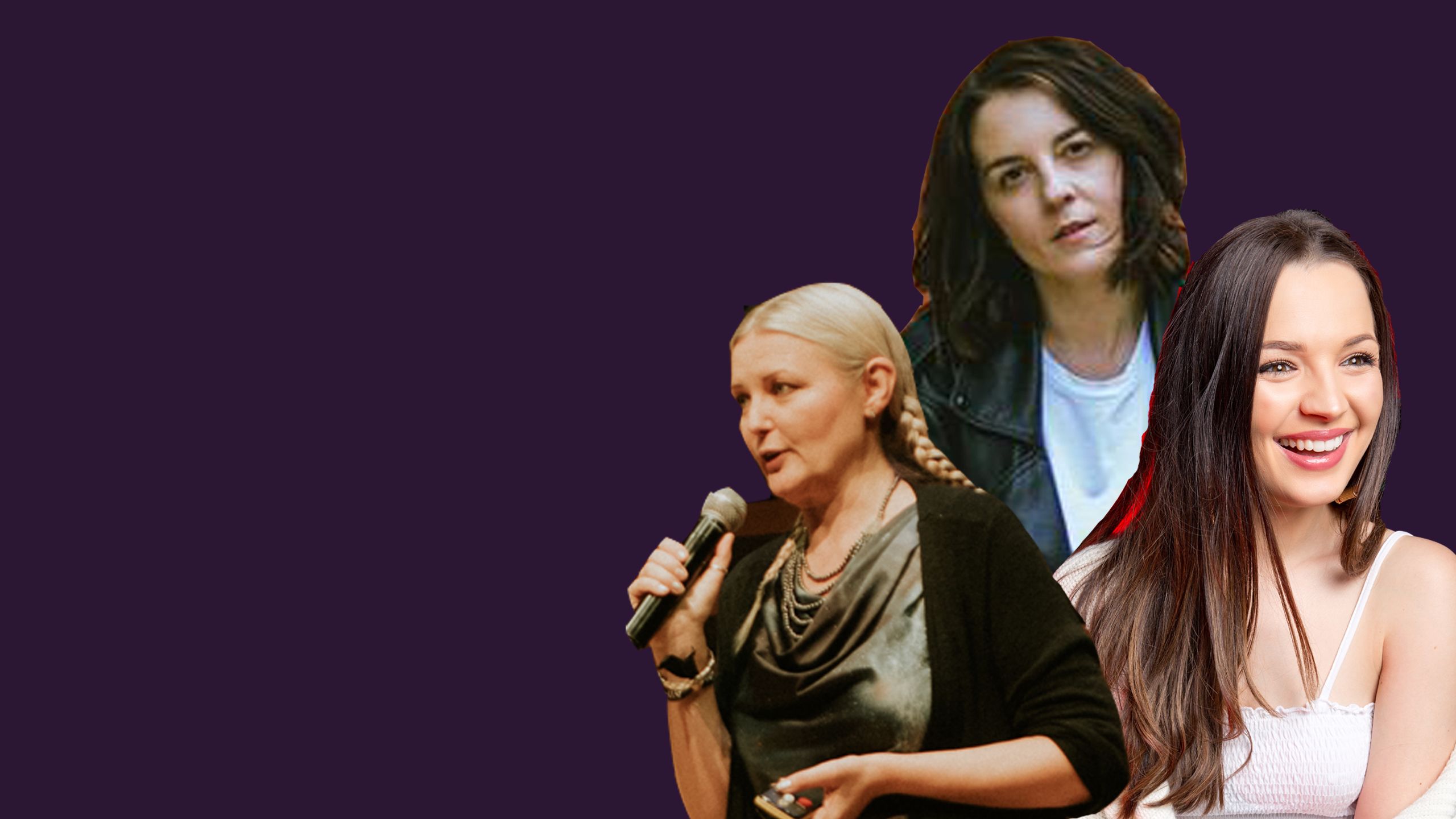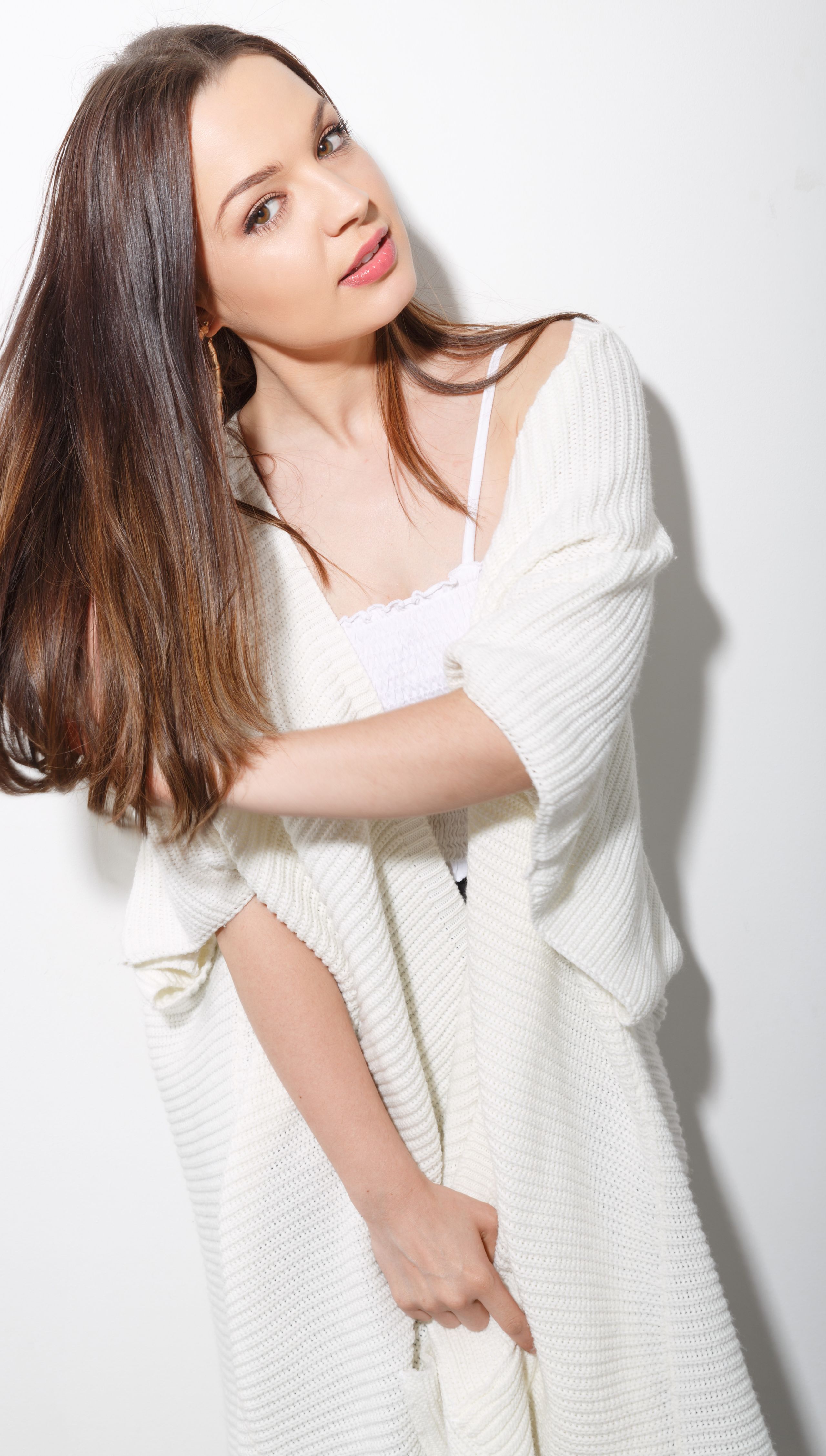Meet the women fighting sexism in music
A singer, a songwriter and an expert
walk into a bar… but this is no joke.
They're calling out sexism and inequality
in the UK’s music industry.

“I’ve had ‘get back in the kitchen’ as a joke. Or ‘get to the back of the room’… you just have to stand up for yourself and say ‘I hope you don’t speak to other women like that. Because you’re doing terrible things for the music industry!’”
Rachel Furner is just one of many women in the music industry who have experienced sexism at work.
She’s a songwriter signed to Universal Music and has written hits for artists including Little Mix and Craig David.
When working with producers in the studio, she says that they have questioned her ability to use music editing software (Logic Pro) and undermined her as a producer.
“I’ve been called a diva because I knew what mic we should be recording on.”

"To be an artist, you have to have energy that goes on for days and the thickest skin"
Before making the move into songwriting, Rachel was an artist. She toured Europe, supporting Pixie Lott, JLS and Olly Murs, before selling out her own headline shows.
“I think that [being an artist] was some of the best times of my life. It was great – but you have to have nerves of steel and you have to have energy that goes on for days and the thickest skin.”
Anxiety was what led her to rethink her career. Although her fanbase was loyal, the pressure which came with being a woman in the spotlight got too much.
“I absolutely loved [being an artist]. But I didn’t realise how much I suffered from very severe anxiety and panic. I panicked about pretty much everything when I got on stage – what if I’m sick or the lighting rig falls down – all these crazy things.”
Since making the move out of the spotlight and into the music studio, Rachel has written many songs including Little Mix’s 2015 hit ‘Secret Love Song’. The tune, which was originally called ‘Behind Closed Doors’, was inspired by her experience of falling in love with her manager.
“I wrote that song three years before it was heard. We wrote it maybe in about half an hour. I had tonsillitis and I was very upset by what I was writing. Three years later someone [heard] my really rough demo, a week later Little Mix are recording it and a few months later it’s released as a single with Jason Derulo on it.”
Secret Love Song by Little Mix is one of Rachel Furner's most well known songs

Rachel Furner speaking on the 'Songwriting Masterclass' panel at BBC Music Introducing Live, October 2019
Rachel Furner speaking on the 'Songwriting Masterclass' panel at BBC Music Introducing Live, October 2019
Even though she is out of the spotlight, Rachel still struggles with her anxiety. It has affected her ability to stand up for herself when she faces sexism, and to be confident in her abilities.
“I know what I’m doing. But as soon as a man’s there, I question my ability.”
“I vocal produce, I produce my own songs. But for some reason, if a man is sitting there, my first reaction is ‘oh I’ll let him do it’. Because he wouldn’t want me to do it.”
The Northamptonshire songwriter thinks that the future is looking bright, because her confidence is growing and women are starting to speak up about their experiences too.
“I think women are getting more confident. I don’t think men don’t want us to be there. I don’t think they don’t want us to use technology. But I do think that we need to have that confidence to [say] ‘I’ve got this.’”
Rachel Furner on why she thinks there's gender inequality in music

Wanting to do something about the lack of data on how many women are in the music industry, Vick Bain took it upon herself to collect it.
The former CEO of The Ivors Academy found that just 14% of composers and songwriters signed to UK music publishers are women. She also discovered that women make up just 20% of artists signed to UK record labels.
“All of the statistics were pretty dismal. I was disappointed. I thought that a third of artists signed to record labels would be women; but for it to be a fifth – what’s going on?”
Vick started her research into gender diversity in music when she was working at The Ivors Academy, where she looked at the results of the annual prestigious Ivor Novello Awards. She discovered that since 1955, just 6% of the award winners have been women.
"Women's voices have been silenced, we need to call that out"
After leaving The Ivors Academy in 2018, she decided to take her research one step further and count how many women work in the music industry.
It took her six months to complete the report, which included counting how many women were signed to UK record labels, how many women were studying music in education and how many women were working in each genre of music production.
Overall, the report showed a distinct lack of female representation in music, particularly in music technology roles and at senior levels, which negatively affects both women and the industry.
“There is a lot of music that could have been created, which we never got to hear… women’s voices have been silenced. We need to call that out.”
“It’s very wrong for an industry that portrays itself as being equal… and liberal, [for the] statistics [to] reveal that it is not those things at all.”
Despite the disappointing results, Vick is hopeful about the future for women in music, because young women are starting to speak out more.
“[Young people are] just far more informed, passionate and educated. They’re not going to stand for it… I have got great hope that things are going to change.”
Vick Bain describes the reaction to her 'Counting The Music Industry' report
“We have been left behind, underpaid, under respected and undermined for centuries.”
Charlotte Carpenter is a singer/songwriter and has faced sexism throughout her career.
When doing soundchecks, she frequently had to deal with sound engineers who wouldn’t take her seriously because she was a ‘woman with a guitar’.
“I went into one room and the sound engineer just wasn’t paying attention. I started playing and he said ‘it’s all too bassey love.’ I said ‘It’s a baritone guitar, that’s what I’m going for.’ Then he just lifted his head, realised what guitar I was playing and was like ‘Ah right, carry on.’”
The 28-year-old thinks that some men don’t expect women to be any good, so don’t pay them any attention or give them any respect.
Charlotte wanted to be a musician from a young age. She was always singing around the house and doing karaoke. Her passion for music led her to release four EPs and set up her own record label, Babywoman Records.
Her music career started whilst studying Popular Music and Sound Technology at university. She was one of around 15 women on a course of about 50 people.
"I think we are beginning to see the repercussions of years and years of gender marketing."
“At the time I didn’t question [the imbalance]. I didn’t even consider that there was a gender problem when I first came to university because I was still really young.”
Charlotte recently returned to her university to give a lecture and was told that the words 'Sound Technology' had to be dropped from the course name, in order to attract more girls.
“Technology doesn’t feel massively appealing to women. And even if it does, we have grown up to feel like we don’t belong in that category."
“I think we are really beginning to see the repercussions of years and years of gender marketing. We should feel like we can step up and do that. We should feel like we have a place and we aren’t competing against men.”
Since graduating from university in 2012, Charlotte has been gigging all over the country. Despite this, just like Rachel Furner, she feels like she has been regularly undermined.
In an effort to connect with people who are also under represented, Charlotte set up Babywoman Records. She wanted to bring together other musicians, who feel like they have been treated unfairly by the music industry, under one record label where they could support each other.
“It’s a community because we are helping each other book tours, sharing press contacts and radio contacts. Things and people that we have met along the way. Why keep it to yourself?”
“Now I’m sitting on top of a brand, anything feels possible."

The future
Despite the challenges which women in music face, those experiencing sexism are hopeful that things can change.
The sexist remarks that Rachel endures are fading away. She, along with Charlotte, thinks that women are becoming more confident to call sexism out, and that the music industry is starting to notice them.
As for Vick's music diversity research? She has vowed to do another audit of the music industry workforce in 2024, and it is only then we will see if gender equality is heading in the right direction.

